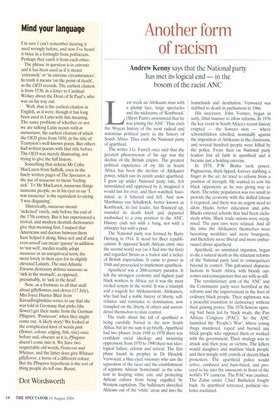Mind your language
I'm sure I can't remember hearing it used wrongly before, and now I've heard it twice in a fortnight from politicians. Perhaps they catch it from each other.
The phrase in question is in extremis and it has been used as if it meant 'extremely' or 'in extreme circumstances'. In truth it means `on the point of death', as the OED records. The earliest citation is from 1530, in a letter to Cardinal Wolsey about the Dean of St Paul's, who was on his way out.
Well, that is the earliest citation in English, as it were, though it has long been used in Latin with this meaning. The same problem of whether or not we are talking Latin occurs with in memoriam, the earliest citation of which the OED gives from 1850, in the title of Tennyson's well-known poem. But others had written poems with that title before. The OED was merely illustrating, not trying to give the full history.
Something that sickens Mr Colin MacLaren from Suffolk, even in the finely written pages of The Spectator, is the use of nauseous to mean 'feeling sick'. To Mr MacLaren, nauseous things nauseate people, so in his eyes to say 'I was nauseous' is the equivalent to saying 'I was disgusting'.
Historically, nauseous meant 'sickened' rarely, only before the end of the 17th century. But it has experienced a revival, and modern shortish dictionaries give that meaning first. I suspect that Americans and doctors between them have helped it along. Since sick and ill and even unwell can mean 'queasy' in addition to 'not well', medics readily adopt nauseous as an unequivocal term, the more lovely in their eyes for its slightly elevated Latinity. The mid-Atlantic Encarta dictionary defines nauseous as 'sick in the stomach', as opposed, presumably, to 'sick in the head'.
Now, as a footnote to all that stuff about gillyflowers and cloves (17 July), Mrs Joyce Hunter Blair from Kircudbrightshire writes to say that she was told in Germany that pinks (the flower) get their name from the German Pringsten, 'Pentecost', when they might come out. A likely story! We looked at the complicated knot of words pink (flower, colour, edging, fish, size) once before and, obscure as it is, Pfingsten doesn't come into it. We have two respectable old words, Pentecost and Whitsun, and the latter does give Whitsun gillyflower, a horse of a different colour. But the Pfingsten hypothesis is the sort of thing people do tell one. Resist.
Dot Wordsworth


























































 Previous page
Previous page